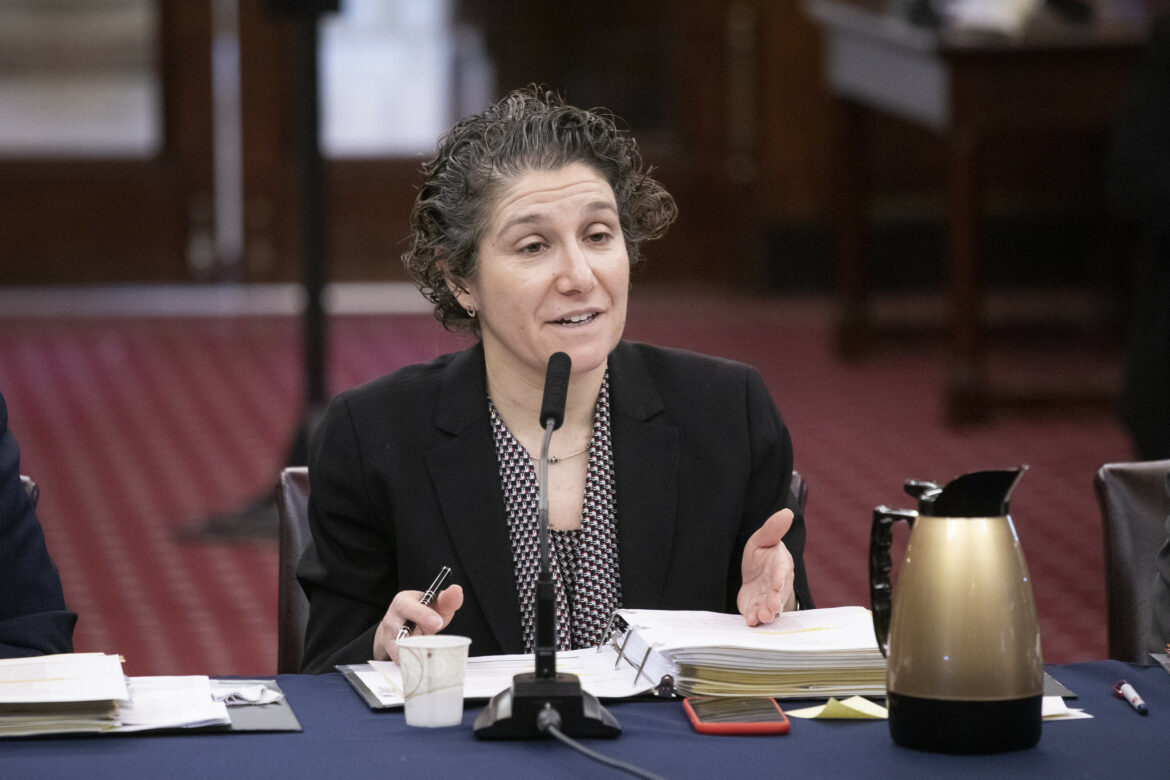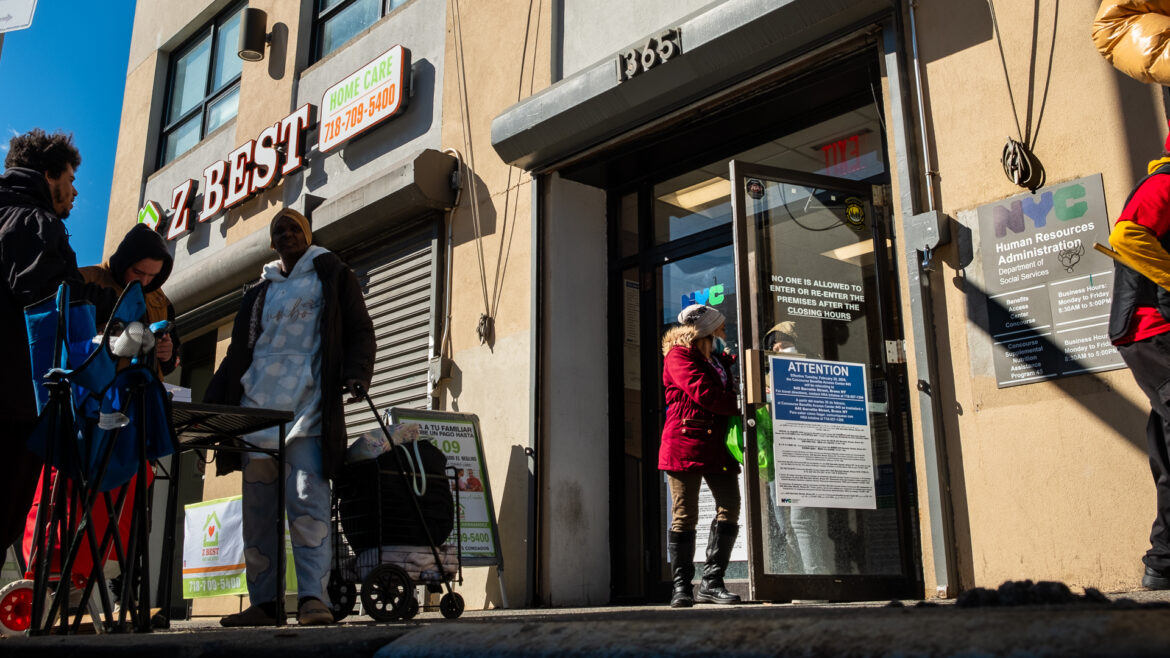New data suggests that the Department of Social Services is bouncing back from historically low processing rates for public benefits, though cash aid applications are being denied more frequently than they were before the COVID-19 pandemic.

John McCarten/NYC Council Media Unit
Department of Social Services Commissioner Molly Wasow Park testifying before the Council’s General Welfare Committee Monday.New data suggests that the Department of Social Services (DSS) is bouncing back from historically low processing rates for public benefits, though cash aid applications are being denied more frequently than they were before the COVID-19 pandemic.
Testifying before the City Council’s General Welfare Committee Monday, DSS Commissioner Molly Wasow Park reported that 55.4 percent of December cash assistance applications were processed on time, up from just 14.3 percent in July through October of 2023 and 28.2 percent in the year ending last June.
Cash assistance includes both small, semimonthly payments for the lowest-income New Yorkers, and larger, one-time grants for emergency needs like rent, known as one-shot deals.
December applications for Supplemental Nutrition Assistance Program (SNAP), commonly referred to as food stamps, had a timeliness rate of 62.9 percent, compared to 41.6 percent in the first quarter of the fiscal year and 39.7 last fiscal year.
“So still room for improvement there but significantly better than they were,” Park said, during a broader discussion on the preliminary budget for the coming fiscal year.
The pandemic prompted a surge in demand for cash assistance, according to DSS, and the number of people receiving cash aid is now 510,000, up 25 percent from the beginning of the Adams administration. About 1.73 million New Yorkers receive SNAP.
Under federal and state law, all SNAP and cash assistance applications must be processed by the Human Resources Administration (HRA), part of DSS, within 30 days. Delays can exacerbate hunger and late rent payments, among other consequences.
Last week, DSS reported the near-elimination of a large backlog of cash and SNAP cases that peaked during the summer of 2023.
Park credited the slashed backlog and improved timeliness in part to increased staffing, including 1,000 new workers hired to process cash and SNAP applications in the past year. Factoring in attrition, the agency saw net growth of 535 workers in this area.
HRA currently has 3,104 staff processing public assistance applications, about 1,900 of whom work on cash assistance cases. The agency as a whole has 10,981 staff, and a vacancy rate of 9 percent.
Also on Monday, Park provided data on the share of public assistance applications submitted in December that were subsequently denied.
SNAP-only cases are processed on a separate track from their cash assistance counterparts, which often have affiliated SNAP cases.
The denial rate for December SNAP-only applications was 52.8 percent, while the denial rate for cash applications that month was 64 percent.
“For SNAP it’s marginally higher than the pre-COVID rate, but it is about 33 percent higher for cash,” Park said.
City Limits recently reported on the volume of cash assistance denials in New York City, and found a 100 percent increase in the year that ended in October, compared to four years prior. The denial reason issued most frequently was for failing to complete an interview.
Before the pandemic, cash aid applications had to be completed at HRA walk-in centers, and interviews were typically conducted in one sitting. But COVID-19 prompted a rapid shift to remote processes, including a phone interview line for cash aid. SNAP-only applicants have had an on-demand interview line since 2015.
Asked why denials have increased so much among cash assistance applicants, Park said the pandemic shift to online applications made it easier for New Yorkers to apply, resulting in more submissions overall, including abandoned applications.
“When you had to physically go into the office and deal with all of the complications of physically going in, people were much more likely to have had every piece of documentation assembled, to have really done their own personal calculation of the tradeoffs and whether or not they were going to qualify for benefits,” Park testified.
“People now are much more likely to start the process early on,” she continued. “That’s fine, but it does mean that there are fewer people who are completing their interview, and that is the primary reason for denial.”
But advocates pushed back, saying the online application process is challenging, particularly for seniors, people who do not speak English as a first language, and those without a reliable smartphone to upload documents. Many have also reported untenable wait times on the interview line.
“That sounds like an excuse,” said Diana Ramos, a benefits recipient and advocate with the Safety Net Project at the Urban Justice Center, responding to Park’s comments. “Sometimes you’re dealing with people who aren’t as tech savvy.”
People who need help don’t “apply for the heck of it,” she added.

Adi Talwar
A former HRA benefits center in the Bronx.Denial rates are a concern, Park testified Monday, and DSS’s accountability office has undertaken a review.
“Thus far we really haven’t seen anything that would suggest that there [are] inappropriate denials happening,” she said, adding that about 10,000 cash assistance interviews are completed each week.
Wait times for cash assistance interviews are currently between an hour and 90 minutes, according to DSS, compared to 30 minutes for SNAP interviews.
Addressing Deputy Council Speaker Diana Ayala on Monday, Park urged her to provide the agency with names of people who are struggling to get through on the phones.
“I would encourage you, if you have specific people who are saying that they can’t get through, if you could share names with us offline that would be very helpful,” she said.
During a brief break in the hearing, Ayala told City Limits that she does bring individual cases to HRA, but that widespread issues persist.
“People are telling us, ‘We’re calling and nobody’s picking up,’” she said.
To reach the reporter behind this story, contact Emma@citylimits.org. To reach the editor, contact Jeanmarie@citylimits.org
Want to republish this story? Find City Limits’ reprint policy here.








